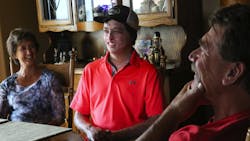FF Badly Burned in WA Blaze Reaches $5M Deal with Utilities
A wildland firefighter badly burned in the 2015 Twisp River blaze has reached a $5 million settlement with two utility companies that he had sued for allegedly failing to keep branches away from a power line that state officials concluded caused the ignition.
The civil suit that resulted in the settlement was filed by Daniel Lyon Jr., the sole survivor of a four-person engine crew overcome by the Twisp River fire. The settlement came just before the state Supreme Court was scheduled to hear oral arguments on the case, which sought to overturn a legal doctrine that largely prevents professional first-responders from seeking damages.
Steve Bulzomi, an attorney representing Lyon, said it is highly unusual for a firefighter in Washington to be able to recover any damages because such cases are usually dismissed.
Lyon’s initial civil claim for $100 million against the Okanogan County Electric Cooperative and Douglas County Public Utility District No. 1 was dismissed in October 2018 by an Okanogan County court. An appeal of that verdict was scheduled to be heard by the Supreme Court, which on Tuesday agreed to dismiss the case because of the settlement.
“I am very grateful that my case calls attention to the plight of injured first responders,” said Lyon, who was burned over most of his body and has undergone more than a dozen surgeries and 100 medical procedures. “I am also grateful my case has reached a settlement so that I can now move on with my life knowing I will have the resources I need for the future.”
Last July, his attorneys, in an appeals brief, argued the Professional Rescue Doctrine that largely bars such claims violates the state constitution, which gives people equal protection under the law and offers the right to seek compensation for damages.
Lyon’s attorneys note that courts in some other states, where the doctrine once held sway, have opted to throw it out.
An attorney for one of the two defendants, in an earlier interview, says the wounds Lyon suffered — however grievous — resulted from risks inherent to the dangerous job of firefighting.
“The law does not allow them (professional first responders) to sue — and there are good policy reasons behind that,” said A Grant Lingg, who represents the Okanogan County Electric Cooperative. “You don’t want the people who start a fire to be afraid to call the fire department for fear that that an injured first responder will sue them.”
The state Department of Natural Resources, which found that branches chafing on a power line caused the Twisp River fire, did not comment on the question of potential negligence. And Lingg said his client contends that state investigators erred in concluding that the fire was caused by a tree branch.
Lyon divides his time between his parents’ house in Missoula, Montana, and the Puget Sound region, where he continues to receive medical care. As a worker injured in a Forest Service job, Lyon receives federal workers’ compensation benefits, which have paid his medical bills and a stipend he says tallies $1,100 a month.
Bulzomi said the state Supreme Court may hear another case that seeks to overturn the doctrine barring professional responders from pursuing damages. That case was filed by nine Seattle firefighters who were injured in a 2016 natural-gas explosion and pursued claims against Puget Sound Energy and contractors.
The Seattle firefighters have petitioned the state Supreme Court to hear their case, which was dismissed by an appeals court.
———
©2020 The Seattle Times
Visit The Seattle Times at www.seattletimes.com
Distributed by Tribune Content Agency, LLC.
